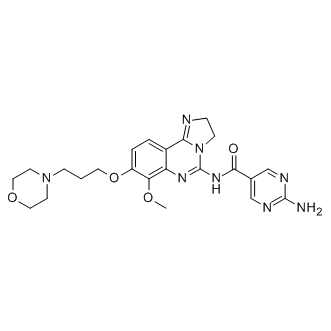| 1.Inquiries will be replied within 24 hours |
| 2.We could supply various packages as you required |
| 3.To protect the profit of our agents, price will not show on website, please send inquiries to get the price. |
| 4.Fast delivery, goods arrive your office within 3 to 5 days |
| 5.Please click "Inquiry" or "Email" below to get the price |
|
|
|
|
white powder |
|
|
C23H28N8O4 |
|
|
|
|
480.52 |
|
in stock |
|
|
1032568-63-0 |
|
99.5% |
Introduction
BAY 80-6946 is an ATP-competitive selective class-I PI3 kinases inhibitor, with IC50s of 0.5, 0.7, 3.7 and 6.4 nM forPI3Kα, δ, β and γ, and much less active against mTOR (IC50=45 nM) and other PIKs (no inhibition at 1 μM). IC50 & Target: IC50: 0.5 nM (PI3Kα), 0.7 nM (PI3Kδ), 3.7 nM (PI3Kβ), 6.4 nM (PI3Kγ)[1] In Vitro: BAY 80-6946 potently inhibits the catalytic activity of the class I PI3Kα, β, γ, and δ isoforms with IC50s of 0.5, 3.7, 6.4, and 0.7 nM, respectively. BAY 80-6946 shows significantly weaker activity against mTOR with an IC50 of 45 nM. In KPL4 cells, BAY 80-6946 reduces basal levels of AKT phosphorylation at both Thr308 and Ser473 with IC50 values of 0.4 and 0.6 nM, respectively. BAY 80-6946 has mean IC50 values of 19 nM against cell lines with PIK3CA-activating mutations (n = 9) and 17 nM against HER2-positive cell lines (n=7), whereas the activity in PIK3CA wild-type and HER2-negative cells is about 40-fold less potent (average IC50=774 nM; n=11)[2]. In Vivo: BAY 80-6946 is highly efficacious in a variety of human tumor xenograft models derived from different tumor indications that exhibit an activated PI3K pathway. BAY 80-6946 is administered at 0.5 to 6 mg/kg i.v. every second day for a total of five doses starting on day 14, following tumor cell implantation. On day 25, 3 days after the last dose, TGI rates of 77%, 84%, 99%, and 100% are observed with BAY 80-6946 at doses of 0.5, 1, 3, and 6 mg/kg, respectively. Complete tumor regression is shown in 10 of 10 rats in the 3 and 6 mg/kg groups, and all rats remained tumor free at the termination of the study on day 73. Tumor growth delays more than 25 days are observed in the 0.5 and 1 mg/kg dose groups[2].







